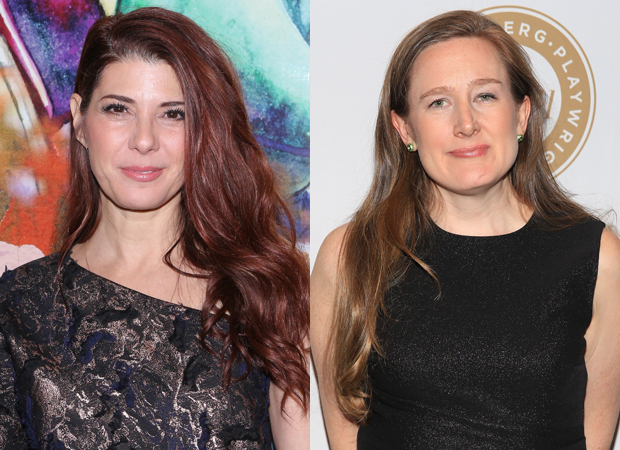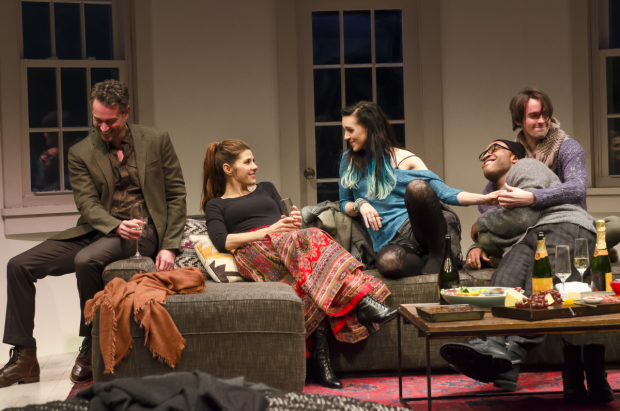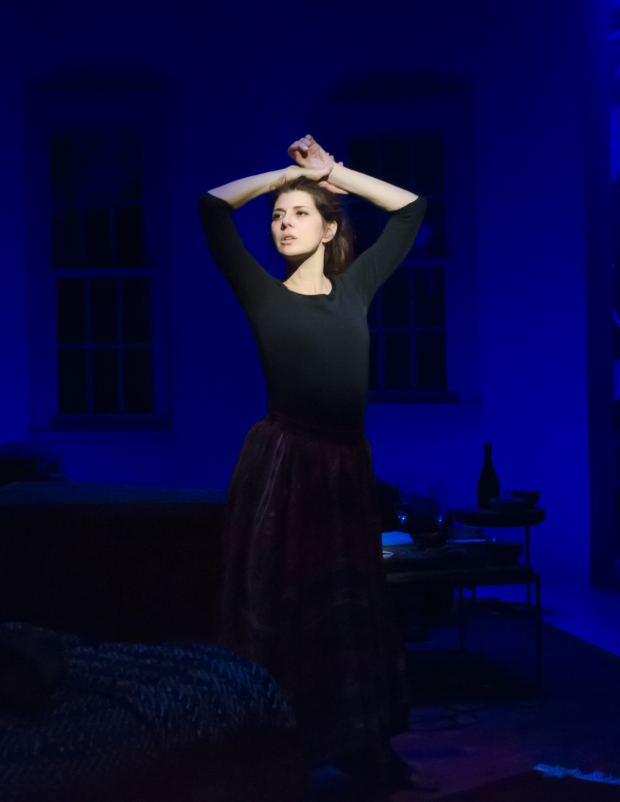Marisa Tomei and Sarah Ruhl On Bringing a New Kind of Love to the Theater
Tomei stars in ”How to Transcend a Happy Marriage” Ruhl’s play about how polyamory affects the lives of two bourgeois couples.
"I think a lot of people are in the closet about being polyamorous," the playwright Sarah Ruhl says. "I had a friend who said, 'Oh, I loved the play so much that I sent another person to it,' and that person said, 'Did you send me because you know I'm in a polyamorous relationship? I thought you handpicked it for me.'"
In How to Transcend a Happy Marriage, which ends its run at Lincoln Center Theater's Mitzi E. Newhouse Theater this weekend, Ruhl explores the concept of polyamory (an open sexual relationship within a group of three or more individuals).
But the dark comedy, which features a cast headed by Oscar winner Marisa Tomei, is more than just about what happens when two ordinary couples are entranced by the members of what one of the characters calls a "triad." In Ruhl's own words, it's about "making your love bigger."
This interview has been condensed and edited for clarity.

(© David Gordon/Tricia Baron)
Sarah, where did this play come from, and Marisa, what was it that interested you in it?
Sarah Ruhl: I had heard of this woman who was polyamorous and living with two men, and also slaughtered her own animals. I was interested in whether the two had anything to do with each other, and also the projections of a bourgeois, settled family onto this life of wildness.
I suppose as someone who's a mother and has been married for a long time, it fascinated me to look at motherhood and sexuality up against each other, which is a challenging concept for some people. Motherhood is often equated with the Virgin Mary, the ultimate mother who never had sex at all. In the play, Jane has that line about how when you become a mother, you have to stop being an animal. I was interested in motherhood and embodiment and also transformation.
Marisa Tomei: The play came along and was speaking to things I was curious about. Being in that space, able to hear the laughter in the auditorium when we're playing, and combining that with a deeper examination of spirituality and sexuality, and how the sacred and profane tangle themselves around each other. There are so many layers to it, and every night I find another layer in the play about life and myself. And the humor is tremendous. The play makes me laugh all the time.

(© Kyle Froman Photography)
Let's talk about representation. This play introduces theatrical audiences to the idea of polyamory, which isn't frequently — or ever, really — explored in the world of entertainment.
Sarah: Something I have a great craving for is making the tent bigger. My last play at Lincoln Center was The Oldest Boy, and we had the Tibetan community coming because there were Tibetan characters and a Tibetan actor in the cast. For many people who came, it was the first play they had ever seen. I've gotten glowing, moving letters from people in polyamorous relationships. I don’t mean to sound self-validating, but I have had people say, "I saw my experience onstage for the first time."
Marisa: I've met people at the stage door and we've had conversations. They found out about this play and came to it because they were curious about seeing their experience and how it was going to be represented. There was such a relief to feel that it was reflecting experiences that they had. I want to hear more from them actually.
Sarah: We interviewed a polyamorous couples from St. Louis, and they have a quite ordinary life, but the logistics were pretty hard to keep track of. They wanted to go on dates with each other as twosomes, but also as threesomes. I was thinking at one point, "How complicated," but as a person with three kids, I said, "But you have a built-in babysitter all the time."

(© Kyle Froman Photography)
Sarah, this isn't your first time working at Lincoln Center, but this play is much more daring for their audience. What have you and Marisa noticed about the audience's reactions to the work?
Sarah: The Lincoln Center audience knows my plays pretty intimately by now. People judge older audiences or think they won't be hip. I was sitting in the audience in previews with a woman next to me who was maybe 95 years old, in a beautiful suit from the late 60s. I thought, "Maybe this play won't be her cup of tea because it's a little wild." She turned to me after and said, "I know who you are, and this is my favorite play of yours." It's less about age and more about openness to experience.
Marisa: Because there's a range of ages and because there is a healthy chunk of older people, there's a whole life experience and understanding that makes it easier to drop into that liminal space together. We're not going to assault you with these ideas. You don't have to worry that you're going to be broken open and not know what to do. We're in it together.
Sarah: This play has a lot of direct address in it, and you need an actress who can be transparent with the audience in a very particular way. Marisa has a very particular bravery in making that vow with them. In a way, it's about something that's completely antitheatrical: the transcendence of daily life.

(© Kyle Froman Photography)
Has working on this play changed the way you look at love and spirituality on a day-to-day basis?
Marisa: Doing any play is a meditation, just saying the words over and over. One of George's needs is…She has her marriage, which is very real and fulfilling, but there's also a great love she wants to experience and incorporate, and, more importantly, not exclude from her life. It's about a marriage, but it's also about one woman's spiritual journey. That micro and macro is something I've thought about a lot in my own spiritual life, and I get to experience living through the paradox of it every night. The space inside myself gets larger to hold the paradoxes of life, the seen and unseen, the mundane and extraordinary. This will live inside me for a while.
Sarah: We started doing this play right after the election. It was enormously helpful to be in a community making a piece of art that, in many ways, is about making your love bigger. I can't claim any increase in my spiritual development, but I can say that making that piece of art with those extraordinary people at that moment in time was very beautiful.








